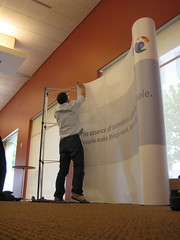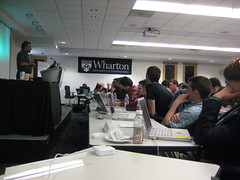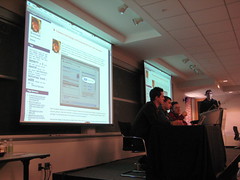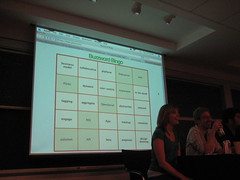Supernova 2008
I attended Supernova last week, which I have to say was one of the most interesting and challenging conferences I've attended. Kevin Werbach and his team at the Wharton School (University of Pennsylvania) did a great job bringing in a plethora of interesting speakers and panels.
There was a fair chunk of admin for me though; BT were sponsoring the event, there were five of us attending, and so there were stalls and flights and hotels and couriers and all that malarky to arrange. Having gone to all the hassle of arranging a big stall on the first day, I got the impression it repelled rather than attracted this particularly savvy audience.

I guess people assume that Big Telco companies don't have much of interest to say. And I guess this is understandable, given that the disruptive projects in this space (Skype, Grand Central, Android, iPhone) have grabbed all the headlines in recent years. We didn't really get a chance to talk to many people, until we ventured out into the room away from the stall - and once we started talking to people, we got a much better reaction.
And it was great to see this perspective being challenged in the Open Flow track on the Tuesday. JP Rangaswami, the MD of BT Design, gave a talk on how important it is for large companies to adapt to these challenging times, and pointed at Osmosoft (for whom I work) as being an example of what BT is trying to do in this space.

We got a much better reaction on Tuesday night as a result. But I digress.
After JP's slot, there were some great panels in the remaining Open Flow track. Tantek Çelik did a great job moderating the 'Whose Social Graph?' panel, pushing Google, Facebook and Plaxo on how difficult it is to get data out of their platforms (particularly Facebook). What made the discussion even more interesting was that the screen behind the panel was used to show the audience's views on the discussion, via Twitter (using Summize). And then the screen was switched to show this blog post by David Recordon, who was in the audience, criticising Facebook for blocking Google's Friend Connect service. Unbeknownest to him, this was on the screen while Dave Morin of Facebook was talking about their supposedly open policy.

Things got pretty heated, and eventually Morin refused to comment further other than to say Google's people were talking to Facebook's people, leading to this great tweet from @psd! Dan Farber and Nic Cubrilovic covered the argument in more detail.
My view: Facebook's business model depends heavily on keeping their customer's eyeballs on their site. They can't afford to release social graph data because it threatens their business, but likewise they have to be seen doing something when it comes to sharing data. Like good politicians, they have a consistent response to criticism about data portability; they talk up their privacy concerns. This is bullshit. Up until now, this has been sufficient to maintain traffic to their site. My stance continues to be this; I will maintain a presence on Facebook because my job requires it, but I will not put data in until I know I can get it out again, and I will visit the site as infrequently as possible in the meantime. And I encourage others to do likewise. It hurts the web.
Phew, rant over!
Anyway, another great panel which followed later in the same track was the Bottom-up Distributed Openness panel, with the founders of Microformats, OpenID, OAuth and OEmbed. My takeaway from this session was how these guys and one gal had seen how painful it had been to invoke standards in the W3C, and had generally decided to restrict their initial efforts to a small, closed group to get their standards off the ground. With impressive results. Turns out selective closed-ness is the way forward in certain situations.
And Jeremy Keith kept did a good job keeping things light-hearted with buzzword bingo running in the background. Waddayaknow, when Leah Culver mentioned RSS and Wikis in the same sentence, we got a House!

There was plenty more going on during the event, much of it outside the sessions, and way too much to record here. But suffice to say it was one of the best conferences I've been too, and I hope very much to be involved next year.
You can see a full set of photos here.
There was a fair chunk of admin for me though; BT were sponsoring the event, there were five of us attending, and so there were stalls and flights and hotels and couriers and all that malarky to arrange. Having gone to all the hassle of arranging a big stall on the first day, I got the impression it repelled rather than attracted this particularly savvy audience.

I guess people assume that Big Telco companies don't have much of interest to say. And I guess this is understandable, given that the disruptive projects in this space (Skype, Grand Central, Android, iPhone) have grabbed all the headlines in recent years. We didn't really get a chance to talk to many people, until we ventured out into the room away from the stall - and once we started talking to people, we got a much better reaction.
And it was great to see this perspective being challenged in the Open Flow track on the Tuesday. JP Rangaswami, the MD of BT Design, gave a talk on how important it is for large companies to adapt to these challenging times, and pointed at Osmosoft (for whom I work) as being an example of what BT is trying to do in this space.

We got a much better reaction on Tuesday night as a result. But I digress.
After JP's slot, there were some great panels in the remaining Open Flow track. Tantek Çelik did a great job moderating the 'Whose Social Graph?' panel, pushing Google, Facebook and Plaxo on how difficult it is to get data out of their platforms (particularly Facebook). What made the discussion even more interesting was that the screen behind the panel was used to show the audience's views on the discussion, via Twitter (using Summize). And then the screen was switched to show this blog post by David Recordon, who was in the audience, criticising Facebook for blocking Google's Friend Connect service. Unbeknownest to him, this was on the screen while Dave Morin of Facebook was talking about their supposedly open policy.

Things got pretty heated, and eventually Morin refused to comment further other than to say Google's people were talking to Facebook's people, leading to this great tweet from @psd! Dan Farber and Nic Cubrilovic covered the argument in more detail.
My view: Facebook's business model depends heavily on keeping their customer's eyeballs on their site. They can't afford to release social graph data because it threatens their business, but likewise they have to be seen doing something when it comes to sharing data. Like good politicians, they have a consistent response to criticism about data portability; they talk up their privacy concerns. This is bullshit. Up until now, this has been sufficient to maintain traffic to their site. My stance continues to be this; I will maintain a presence on Facebook because my job requires it, but I will not put data in until I know I can get it out again, and I will visit the site as infrequently as possible in the meantime. And I encourage others to do likewise. It hurts the web.
Phew, rant over!
Anyway, another great panel which followed later in the same track was the Bottom-up Distributed Openness panel, with the founders of Microformats, OpenID, OAuth and OEmbed. My takeaway from this session was how these guys and one gal had seen how painful it had been to invoke standards in the W3C, and had generally decided to restrict their initial efforts to a small, closed group to get their standards off the ground. With impressive results. Turns out selective closed-ness is the way forward in certain situations.
And Jeremy Keith kept did a good job keeping things light-hearted with buzzword bingo running in the background. Waddayaknow, when Leah Culver mentioned RSS and Wikis in the same sentence, we got a House!

There was plenty more going on during the event, much of it outside the sessions, and way too much to record here. But suffice to say it was one of the best conferences I've been too, and I hope very much to be involved next year.
You can see a full set of photos here.
Comments
It does seem to have ended up as a kind of Friends Reunited with loads of profile spam. Whilst there are apps that will let you extract birthday and event data (but most annoyingly not email) it does all seem very, very closed.
If possible, could you elaborate more on how it is bad for the internet though? Is it that it locks so many users into that large walled garden and make it hard for them to go elsewhere?
And I appreciate the fact that Facebook has helped me hook up with old friends. Although, having said that, not many of these reconnections have been particularly rewarding, beyond saying hello and finding out what each other is up to. Maybe that's why we didn't stay in touch in the first place, and maybe that's just me.
But we only need to look inside the enterprise to see the perils of closed systems. Or look at vendors that use proprietary standards. These principles stifle innovation and prevent growth - and this at a time well after open APIs and open standards have proved their worth. That's what I mean by hurting the web. It's a big, clumsy step backwards.
Here's a crude example. My most recent blog posts all contain media that couldn't have been displayed on my blog if it had originated in Facebook. Most people don't blog but, just like with DRM, I can imagine many customers using the service getting a horrible, sudden shock when they try to move their content (or their social graph) elsewhere.
Zuckerberg claims that Facebook has been built this way because revenue is based on eyeballs. But the open approach hasn't hurt Google, Flickr or Firefox - on the contrary, its resulted in a thriving ecosystem of loyal users and developers that are eager to contribute back to the community. Yes, you can question how open each of these are, but compared to Facebook, they're a paradigm of virtue.
So I think it is incumbent on those of us with technical acumen and industry knowledge to at least inform our less tech-savvy friends of the risks associated with putting content into the Facebook walled garden. At the moment, the trust is misplaced and ill-informed. We now have DRM that we can point at as the example of what can go wrong. And there are excellent open alternatives for every valuable function of Facebook; whether it be Flickr, Twitter, Blogging platforms, YouTube, Vimeo, Friendfeed, and whatever comes next.
There are those who have their doubts about Open Social and other similar initiatives. But I'm pleased there are groups whose motive is ensuring that such initiatives are as open as they claim to be. I'm therefore confident that, whatever emerges next from this space will be whole lot more open than Facebook.